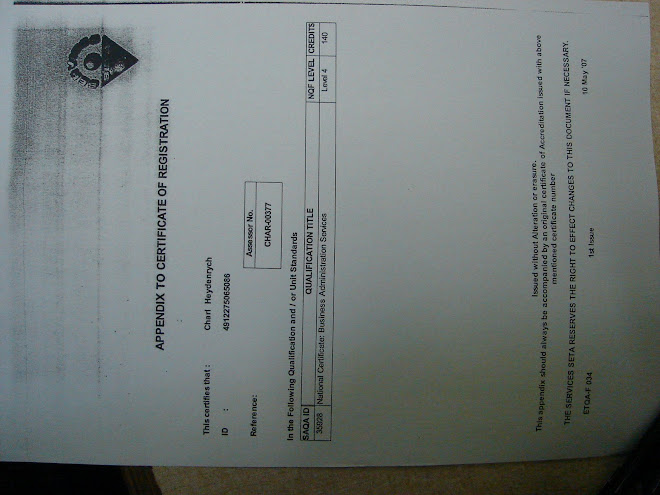COLUMN FOR PROPERTY PROFESSIONAL
June 2009
Get your new qualification as soon as possible
Wherever you go and whoever you speak to in the real estate industry these days, the major topic of conversation is surprisingly not the state of the economy, or even the banks’ unusually tough lending criteria, but the Department of Trade and Industry’s new education and training requirements for agents.
These came into effect last July and have already caused many people (including, hopefully, most of the fly-by-nights) to leave the industry for good, and bring the number of registered agents crashing down from 84 000 to 38 000 in the past two years.
They are also costing many of those agents who remain in the industry a great deal of time and money to obtain – at a time when things are particularly tight financially. In fact, the total training bill for those agents currently registered with the Estate Agency Affairs Board (EAAB) can be estimated at close on R400m – and that does not include the fortunes spent by training providers on developing their learning programmes and course material for accreditation by the Services Sector Education and Training Authority (SSETA)
Consequently, it is not surprising that recent moves by the Estate Agency Affairs Board (EAAB) to earn further income from those trying to get qualified has been particularly badly received.
The issue came to light a few weeks ago, when reports began to emerge of agents being told by the EAAB that the qualifications they were obtaining from certain training providers accredited by the SSETA would not satisfy Department of Trade and Industry regulations for registration by the EAAB. The effect of this would be that the agents concerned who had completed the NQF4 qualification or the RPL process through such a training provider would not be able to obtain a Fidelity Fund Certificate after the cut-off date of 2011 and would thus would not legally be able to practise.
It subsequently emerged that the EAAB was trying to make the purchase of its own 800-page textbook a prerequisite for agents’ new qualifications to be recognised. It also issued a directive to various training providers that the book was to be used exclusively as the basis for their learning programmes or their qualifications would not be recognised for the purposes of registration with the EAAB or qualifying for a Fidelity Fund Certificate.
This prompted a swift reaction from the SSETA, whose CEO Ivor Blumenthal has pointed out in two strongly-worded letters to training providers and estate agencies that:
* The EAAB has no authority to question the validity of estate agent NQF4 and NQF5 level qualifications offered by any training provider that has been accredited by the SSETA - which is the only organisation officially delegated by the SA Qualifications Authority (SAQA) to accredit real estate industry training providers.
* The EAAB has no authority to dictate any particular curriculum or learning material to any training provider that has been accredited by the SSETA, or is seeking accreditation. In fact the principle of the accreditation process is that the training provider must develop its own course material and learning programmes.
* The EAAB is not entitled to make the use of its textbook compulsory in order for estate agents to be registered or issued with a Fidelity Fund Certificate. The book in any case contains no reference to the curriculum design process inherent in the SAQA accreditation process, and nor has it been accredited as formal learning material for the new NQF4 and NQF5 qualifications for agents.
The SSETA, says Blumenthal, will be meeting with the DTI to resolve these issues, which it has already taken up with the EAAB, but in the meanwhile, agents should be very clear that as long as they have obtained their NQF4 qualification from a training provider accredited by the SSETA, that qualification will be a SAQA-approved national qualification.
He also says agents should disregard “any and all” indications that such qualifications will not meet the DTI regulation for EAAB registration, and urges training providers to continue their activities in terms of their original conditions of accreditation.
As chairman of the board of the Real Estate Chamber of the SSETA, I support the decision by the SSETA to also obtain a legal opinion on these actions by the EAAB, so that clarity can be obtained on the correct processes, and have also said that IEASA will continue to be involved in the process of searching for a solution.
As things stand, the IEASA regions around the country are strongly promoting the new qualifications and working with accredited training providers to ensure that members obtain the necessary training as soon as possible, in many cases with the aid of a SSETA bursary.
For new agents and those with less than a year’s experience, the route to qualification is quite simply an NQF4 course and an exam pass. For others, however, the process is a somewhat more complicated as it involves assembling the necessary material to obtain a Recognition of Prior Learning (RPL) assessment and quite often some classroom time to fill in the “gaps” in the knowledge needed to obtain the new qualification.
Meanwhile, progress is also being made with establishing the unit standards for the NQF5 qualification for agency principals and the NQF7 qualification which may relieve agents with more than 10 years’ experience from having to go through the RPL process. The real bottleneck here currently is the lack of people qualified to moderate and assess agents at these levels, but we are confident that this will be resolved within the next few months.
*For more details about the new qualifications and training requirements, agents should contact their nearest IEASA regional office, or visit www.ieasa.org.za
(Received via e-mail from Anthony vd Riet)
Pringle Bay
-
Name:https://en.wikipedia.org/wiki/Pringle_Bay Google count: Date: Historic
fact: Other interesting info: Where to stay:
8 years ago







